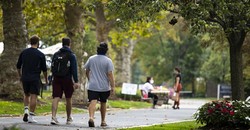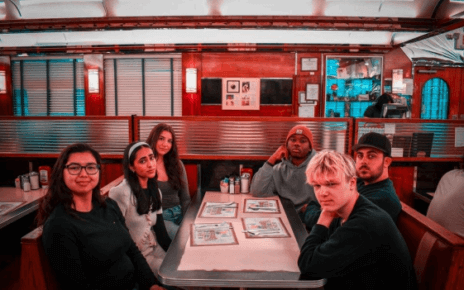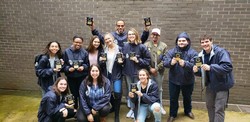The final of four Moments at Monmouth forums took place via Zoom on Thursday, Nov. 12.
Following the virtual campus climate presentation and individual sessions for students, faculty and staff, an open forum was held to support dialogue between the entire Monmouth community.
University President Patrick F. Leahy Ed.D., along with other senior administrators attended the event to listen to the community’s experiences, views, and suggestions on Monmouth’s culture surrounding diversity and inclusion.
Leahy kicked off the discussion with a few opening remarks about his intention hosting Moments at Monmouth. “The goal is pretty simple; I want to make sure I’m available to you around this topic in particular… It’s important for me to hear from the campus community about your experiences here, what you hear, and ideas you have about ways we can improve,” he said.
Acknowledging his privilege, Leahy continued, “it is clear to me that I’m as privileged as you can get. I’m a white, (hopefully still middle-aged at 52) cisgender able-bodied male so I never claimed to be able to understand the experiences of underrepresented members of our communities. I want to hear and listen to whatever it is you want to say.”
“I will listen and not speak this session. It is not easy for most university presidents, this one in particular, but I’ve committed to that,” Leahy concluded.
There were no prompting questions throughout the forum, so participants could share their perspectives freely.
Laura Jannone, an Associate Professor of Nursing, was the first to speak. “In 21 years, I have seen a big change, not enough change for me,” she said.

Jannone explained that throughout former President Obama’s two terms, she sensed a change in how Black students felt they could celebrate. However, during this presidency, students and faculty alike have found it more difficult. “I think we have a long way to go, and I love that we changed [Wilson Hall], we’ve been wanting to do that for a long time,” she said.
After a few moments of silence, Walter Greason, Ph.D., an Associate Professor and Chair of Educational Leadership, said, “This is always a hard thing to get started, having people feel comfortable sharing their perspectives.”
He mentioned an online forum for faculty he is a member of on Facebook that provided the opportunity to discuss the campus climate survey, both assessing the current moment and finding ways to improve. “One of the comments I made was how to we discuss specific issues in our respective units. All of us have a unique perspective and that’s what I’m here for. I want to hear from everybody about what they’re taking away from the current moment,” Greason said.
From being online, Catherine Duckett, Ph.D., Associate Dean of the School of Science, noted there’s a lot of nonverbal things that go on. “What I’ve found from having international students in my zoom class, one from India and one from Australia, they are much more outspoken than I’ve found other students to be. Much more willing to be forthcoming about how things are…” she said.
Judy, who works in the School of Humanities and Social Sciences, said of the current discussion, “I hope that this discussion is not just on teaching and students in the classroom with faculty.” Having been at Monmouth nearly 20 years, Judy is most bothered by policies in place that she feels are not applied equally. “I see that a lot on the staff level and I hope in the future those are changed, like how interviews are done, I have been a witness to those things.”
Many faculty and staff members feel that Monmouth lacks presence in its community. Kelley Schwartz, a computer trainer with 15 years of experience in higher education, said, “But one thing that’s always puzzled me is our student population isn’t more diverse… we boarder a city that has a huge Latino and Brazilian population and they don’t even know we’re here. I’m not sure what the answer is but I try to promote us as much as possible.”
Similarly, Duckett conducted an informal survey of places she frequents in Long Branch, and one of the only places that viewed having Monmouth as a resource to the community was the liquor store. Duckett suggested that the Monmouth community should be more aware of posting events to social media. “There’s a lot of diversity in our local communities and we need to be in conversation,” she said.
Aimee Parks, Assistant Director of Human Resources for Student Employment, mentioned that her office releases federal work study students in a lot of the Long Branch schools to advise schools.
In terms of outreach efforts, Victoria Bobik, Director of Undergraduate Admission, explained outreach is a complex issue, and her office has developed extensive outreach programs and financial aid programs with local high schools. “We get a lot of students from Long Branch and Asbury but getting a student to want to come here is not enough, we’re a $56,000 institution and getting them aid is incredibly important [as well as helping them] with the Educational Opportunity Fund and getting students for visits,” she said.
“It’s diverse and complex as an outreach effort… It’s a cumulative effect that takes a long time to change, and that’s what we’re talking about, a culture on campus,” Bobik said.
Relating to Judy’s point on employee experiences, Greason said, “Over the years I’ve been an employee at Monmouth the core thing I don’t think we get to talk enough about is why people who come from Black or indigenous communities feel uncomfortable at best and worst cases actively afraid.”
“When I would drive to work and try to park, for years, the suspicion I was greeted with, no one was putting together that I was a regular part of the community,” Greason said. There were repeated instances of verbal harassment he had to report to campus police.
Michael Phillips-Anderson, Ph.D., an Associate Professor of Communication, shared an experience a Black student in his rhetoric class had. He was asked daily what sport he played, but he had never been an athlete. “The white students couldn’t imagine there was a black man on campus that didn’t play sports,” he said.
William Schreiber, Ph.D., Lecturer in the Chemistry Department, said, “I really appreciate those last two comments, I’m very privileged and hearing examples is what I’m looking for to become more sensitive and on the lookout for issues.”
PHOTOS COURTESY of Anthony DePrimo




